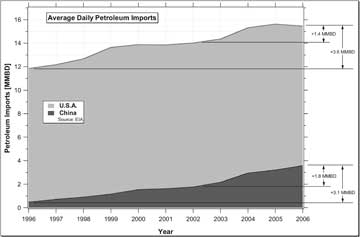|
A COMMENT ON ...
Energy: Don’t Blame China for High Oil Prices
Michael E. Webber
 Courtesy of Michael Webber |
| The average daily petroleum imports in millions of barrels per day (MMBD) for the United States and China have shown similar patterns of growth over the last decade. U.S. petroleum imports have grown 3.6 MMBD since 1996, and 1.4 MMBD since 2002. China’s petroleum imports have grown 3.1 MMBD since 1996, and 1.8 MMBD since 2002. Overall, U.S. consumption and imports of petroleum are three and four times larger than China’s, respectively. (Source: U.S. Energy Information Administration) |
Don’t look now, but energy prices are on the rise again. And, as before, articles, commentaries, pundits and letters to the editor will all decry the same foe as bearing responsibility for these higher prices. In a refrain that is eerily repeated countless times almost word for word across the front pages of newspapers and respected news programs nationwide, we hear the culprit’s name, loud and clear: The People’s Republic of China.
It’s all China’s fault. Our most trusted newspapers and talking heads have told us that China’s “soaring demand,” “insatiable thirst” and “quest for oil” — absolutely unprecedented throughout the broad sweep of human history — are single-handedly responsible for the run-up in energy prices (though to be fair, some people will also lump in India for adding fuel to the fire, so to speak).
The reason China is assigned so much blame is because Chinese oil consumption has been on an amazing rise over the last decade, with its daily demand for petroleum increasing by more than 3.6 million barrels between 1996 and 2006. In other words, China presently demands 3.6 million more barrels of oil every single day than it did in 1996. Though Chinese domestic oil production has increased to meet some of that demand, China today still imports 3.1 million more barrels every single day from the world markets than in 1996, making imports about half of their total consumption and helping to drive up world oil prices.
And so it’s no wonder these clever pundits neatly pin the blame for high prices on recent Chinese demand. After all, any country that imports such a high percentage of oil for their own selfish use and whose absolute growth in oil imports has been so steep must clearly be an inconsiderate energy hog who doesn’t play nice with others and is deserving of shame, blame and ridicule. How dare they buy the oil we planned on buying!
But the part of the story that is repeatedly left out is that over the exact same time span, U.S. oil demand rose as well, and our imports of oil from the world markets went up 3.6 million barrels every single day, which is even greater growth than witnessed in China’s imports. These new imports of oil from the world make America’s “soaring demand,” “insatiable thirst” and “quest for oil” just as responsible for high prices as China’s.
Even if you just look at the last four years (2002 to 2006), when China’s economic growth was especially rapid, their imports grew by 1.8 million more barrels per day, barely exceeding America’s growth in oil imports of 1.4 million more barrels per day. By comparison, today the United States imports just over two-thirds of our petroleum and more than four times as many barrels of oil in total than China, while our total consumption (including domestically produced petroleum) is about three times larger. And these staggering differences are occurring despite having a population one-fourth the size.
Somehow, these important pieces of information are universally missing from our collective consciousness. It’s as if we operate from the mindset that rapidly growing demand for imported oil is acceptable in America, but not in China.
Or perhaps we’re just angry because they didn’t ask our permission first to buy “our” oil.
Any way you slice it, America is the number one energy hog in the world. If we want to find someone to blame for high energy prices, then it’s time to take a good long look in the mirror.

 Subscribe
Subscribe


